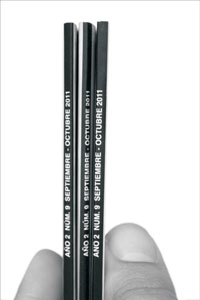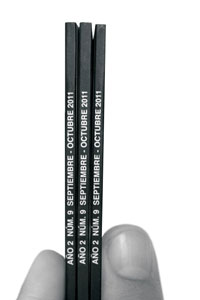Troubleshooting bindery problems can be frustrating, with dozens of variables often leading us in the wrong direction. As we gain experience the process is simplified because we learn to quickly narrow down the field of possible causes to a handful of critical items.
Experience can also work against us as we learn to accept the ‘unsolvable’ problems or we overlook the source of a problem because it’s never happened to us in our experience. For instance, what appears to be a folding register problem due to incorrect fold roller settings might actually be the result of inconsistent feeding. If it’s the first time the feeding issue occurred on that machine, there’s a good chance we’ll initially overlook it as the cause of the register problem.
 If we can learn to listen to experience but keep the mind open, the benefits can be bigger than we expected. Here’s a real-life case which shows how the solution to a perfect binding ‘register’ issue ultimately boosted one company’s position in the marketplace.
If we can learn to listen to experience but keep the mind open, the benefits can be bigger than we expected. Here’s a real-life case which shows how the solution to a perfect binding ‘register’ issue ultimately boosted one company’s position in the marketplace.
Rodrigo Castellanos of Offset Universal SA was not happy with the quality of their perfect bound books. The backbones appeared slightly rounded and register was not up to the company standards for their Muller RB-5 perfect binding lines. (photo left) The problem worsened with lighter cover stocks.
 In his experience it initially seemed to be a register problem with the cover feeder. We talked about the issue and decided to try one of our Spine & Hinge Creasers on his Muller. The result: problem solved.
In his experience it initially seemed to be a register problem with the cover feeder. We talked about the issue and decided to try one of our Spine & Hinge Creasers on his Muller. The result: problem solved.
What we both initially perceived to be a ‘register’ issue was actually a problem with scoring. The correct, well-defined score, appropriate for the weight of cover stock, allowed the binder to form the cover neatly around the book block. (photo right)
That’s not the end of the story. Yes, it was great that his production problem was solved. The rest of the story is that their newfound ability allows them to produce higher quality books on a wider range of cover stocks than any of their competitors, even though the competitors are running newer equipment. The net result for Offset Universal is that there is no competition on certain jobs.
There’s a saying I like because it applies particularly to post-press work…”little hinges swing big doors.” A few tiny changes here and there, seemingly insignificant and even unimportant to the casual observer, can add up to profound changes in the life of a business.
In the case study above, the company could easily have ignored the minor ‘register’ issue since all the perfect binding vendors in their marketplace had the same problem. It was a level playing field. By stepping outside their experience and altering one little piece of the puzzle, it changed their position in the marketplace.
The good news for us in post-press is there are hundreds of “little hinge” opportunities to work with. The bad news is, well, there are hundreds of little hinge opportunities! But it’s not hopeless. Use the lens of your experience to focus on a few important hinges, and then brainstorm ideas for improvement.
Then keep doing it because you will never run out of opportunities to improve. Make it a part of your job, even if no one requires it of you. In time your colleagues will wonder how you get so much done while it all runs so smoothly.
As always we welcome your shared experiences and comments below.

